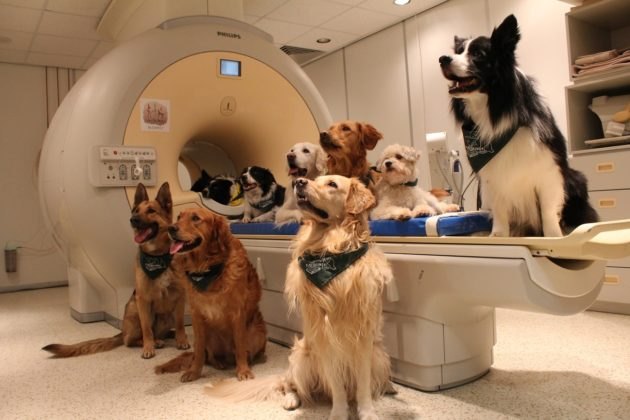Study: Dogs Understand Us When We Speak in Positive and Negative Tones

Ever wonder why when you get that sweet new puppy, and you’re full of energy and excitement, Fido returns the emotion? And then…when it’s time for him to “See a man about a dog,” in the freezing cold, you saying, “DO YOUR BUSINESS!” doesn’t convey the same motivation on your dog’s part?
Neuroscientists out of Budapest wondered the same thing, and have confirmed through the use of functional magnetic resonance imaging, or fMRI that our dogs seem to know what we are saying. (Don’t worry–all dogs were wide awake for scans and as happy as a dog with two tails to help do their part for science!) The findings, which will come out in this week’s issue of the journal Science, prove what we dog lovers knew in our hearts…when we tell our pup to, “Be a good girl!” as we leave the house, Fifi understands, and knowing dogs, mulls it over with a mischievous little laugh!
Co-Contributor Atilla Andics of Hungary’s Eotovos Lorand University shared, “There is a well-known distribution of labor in the human brain. It is mainly the left hemisphere’s job to process word meaning, and the right hemisphere’s job to process intonation. The human brain not only separately analyzes what we say and how we say it, but also integrates the two types of information, to arrive at a unified meaning. Our findings suggest that dogs can also do all that, and they use very similar brain mechanisms.”
Not only is dog man’s best friend, but now, a linguistician as well!
Related: Six bizarre ways our dogs talk to us
So, how does one get fMRI information from a four-legged volunteer? Andics and his colleagues colleagues first had to train the 13 dogs they used in the study to lie very still in the scanner. Simultaneously, the dogs listened to a series of words that had previously been recorded by their trainers. These recorded words were a mix of praise and neutral words. Each set of words was spoken in a high-pitched, praising intonation (“colleagues a good girl? Whooooo? You are! You are!”) as well as with flat affect and neutral intonation (borrrring!).
The dogs responded to the words of praise with heightened brain activity in the left hemisphere, whether or not they were spoken in a praising tone. That’s right…even when the words were spoken with no real enthusiasm or extra energy, the dogs knew the words of praise and responded, regardless.
Analyzing the scans, the researchers found that the dogs’ reward center in the brain was activated only when dogs heard words of praise, spoken with the intonation and inflection of praise also.
“It shows that for dogs, a nice praise can very well work as a reward, but it works best if both words and intonation match,” Andics said. “So dogs not only tell apart what we say and how we say it, but they can also combine the two for a correct interpretation of what those words really meant.”
So yeah, pretending to be chipper and happy to be outside in sub-zero temperatures while your pet looks for juuuuust the right place to do his business will not work if you are at the same time telling him to get his arse in the house, dammit!
Related: Study finds you can’t fool a dog
Always the faithful friends to us humans, these study dogs shared information that is important to human language as well, and specifically the evolution of human speech. “Our research sheds new light on the emergence of words during language evolution,” Andic said. “What makes words uniquely human is not a special neural capacity, but our invention of using them.”
So the next time you think you’re hot stuff because you can understand something that the dog can’t…think again. Your pet knows what you’re saying, and how you’re saying it! Brings new meaning to Hush Puppy, now, doesn’t it?
[Source: The Verve]

More by Lori Ennis

























